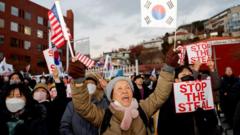The early morning stand-off in South Korea intensified as police attempted to execute a warrant for the arrest of suspended president Yoon Suk Yeol. Crowds had gathered outside his residence, comprised of his fervent supporters who had braved the bitter cold to prevent law enforcement from entering. Reports indicated that many expressed despair and outrage at what they perceived as a radical shift in their country's politics.
As dawn broke, police officers advanced towards Yoon's home but were swiftly met with resistance from a protective formation of soldiers and security personnel. Despite being equipped with a legal warrant for Yoon's arrest, their attempt was obstructed, leading to frustration and tension that escalated throughout the day. Observers noted that this incident marked a significant moment in South Korea's political landscape, as it was the first time a sitting president faced arrest, raising concerns about the stability and authority of the government.
Following Yoon's impeachment three weeks prior, which stripped him of presidential power, law enforcement found themselves in a perplexing situation. The absence of a clear procedure for handling a simultaneous impeachment and arrest of a president added to the uncertainty of the legal framework. Reports revealed that many officials grew increasingly concerned for their safety, with security personnel forming a human barrier, some visibly armed.
The political backdrop is further complicated by Yoon's resistance to cooperate with investigators. He has consistently defied requests for questioning related to serious allegations, including inciting insurrection, which carries severe penalties. His refusal to engage in the investigation has escalated tensions, leaving investigators with no choice but to take drastic measures to enforce the law.
Supporters of Yoon rejected the legitimacy of the proceedings, echoing conspiracy theories suggesting election fraud and infiltration by pro-North Korean influences. Armed with conviction, loyal supporters stood resolute outside his residence, many vowing to protect him at all costs. Yoon, in turn, has encouraged this sentiment, expressing gratitude to his supporters for their unwavering loyalty.
The spotlight has now shifted to acting President Choi Sang-mok, who is faced with the dilemma of asserting authority over Yoon's security and navigating the precarious political environment. The opposition party has reiterated demands for police to enforce the warrant and address barricades obstructing justice.
As the January 6 deadline for the arrest warrant approaches, the likelihood of future attempts will undoubtedly depend on modified strategies or negotiations with Yoon’s security. The present circumstances have emboldened Yoon's supporters, who view the standoff as a victory, likely bolstering their numbers and resolve in the days ahead.
This unprecedented event has ignited a broader discourse on presidential authority, civic obedience, and the fragility of democratic institutions within South Korea, leaving many to ponder the implications of this political saga on the nation’s future.



















